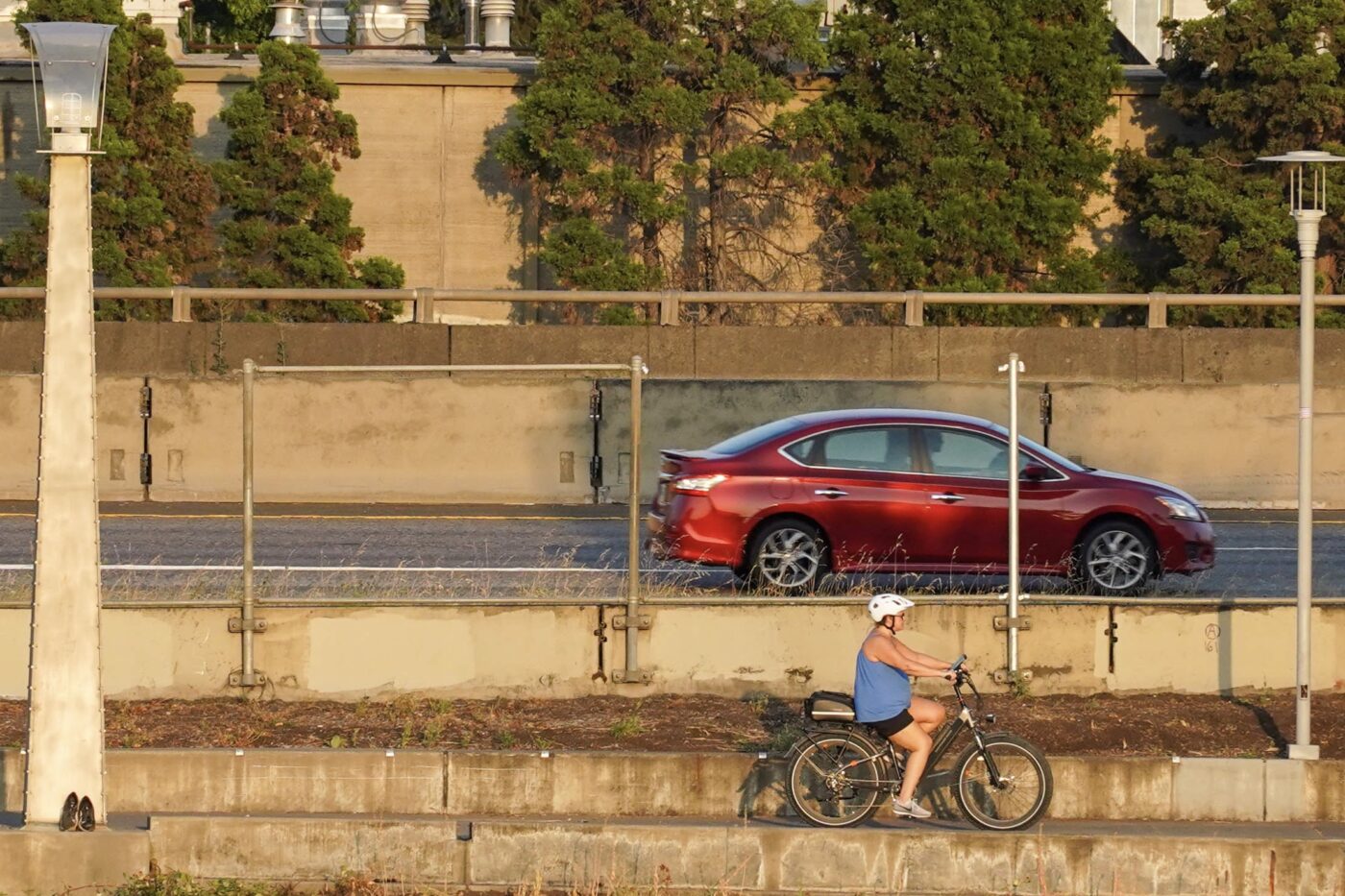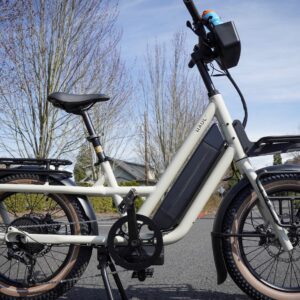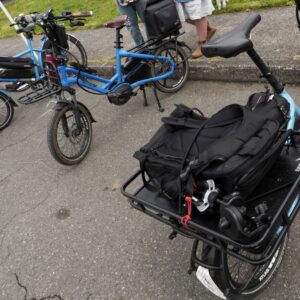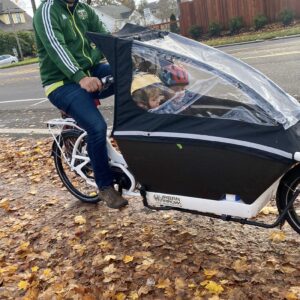
— This opinion comes from e-bike advocate RJ Sheperd
With the Oregon Legislature reconvening following weeks of Senate Republicans walking out, the legislature is finally back to work. What seems to be missing on the agenda is a key legislative win-win-win for Oregon families, our climate, and our communities: the Oregon E-Bike Rebate Bill (HB 2571), sponsored by Rep. Dacia Grayber (D-28), Rep. Mark Gamba (D-41), and co-sponsored by Rep. Khanh Pham (D-46).
HB 2571 would offer $1,200 off on an Electric Bike for those making less than 80% of median family income, and a $400 rebate for those making more. With just $6 million, HB 2571 will provide over 11,600 rebates to Oregonians! Oregon would join Colorado, California, Connecticut, Hawaii, Rhode Island, and Vermont in offering E-Bike rebates to address transportation emissions.
With less than a week in the session left to go, the bill is currently slated to die in the Ways & Means Committee despite it passing nearly unanimously (9-1) in the Climate, Energy, & Environment committee. It would also likely pass with bipartisan support in both the Senate and the House, but the bill still needs a hearing on a Ways & Means subcommittee. That also means we likely won’t see a statewide rebate for at least another two years, until the next full session.
But, there is still time to act! You can email Speaker Rayfield, Co-Chairs of the House Ways & Means Committee Rep. Sanchez and Sen. Steiner with a letter of support for this important bill at this convenient website and get this bill sent over to the House and Senate.
Electric bikes are essential to meeting Oregon’s stated goal of 10% fewer emissions of 1990 than levels by 2050. The fact remains that 40% of Oregon’s emissions coming from transportation and we can see the impacts of climate change right now with record breaking sea surface temperatures, Canadian wildfires, and “heat domes” becoming more likely in the Pacific Northwest. We must act now.
The e-bike rebaite would offer additional benefits by reducing emissions in areas of Oregon with poor air quality, increasing physical activity to build healthier communities and reducing healthcare costs, and reducing transportation costs for families. Additionally, 100% of the rebate must be spent at in-state retailers, ensuring this rebate creates Oregon jobs to sell and maintain these e-bikes moving forward.
There is widespread support for this measure, from the City of Bend to Hood River, from local bike shops to statewide environmental organizations. But that’s not enough. We need hundreds of letters to the Speaker and Co-Chairs to push this over the hill and to coast through the House & Senate.
E-bikes may be the fastest way we can rapidly reduce transportation emissions. 51% of trips in Portland alone are less than 3 miles. PSU’s John MacArthur found that if just 15% of trips were made by E-Bike, Portland would reduce its transportation emissions by 12%.
Get your message to Speaker Rayfield right away!
The Oregon Legislature has an exciting opportunity to power up our communities, and to protect our planet by passing the E-Bike Rebate this session. Let’s not wait another two years to act.







Thanks for reading.
BikePortland has served this community with independent community journalism since 2005. We rely on subscriptions from readers like you to survive. Your financial support is vital in keeping this valuable resource alive and well.
Please subscribe today to strengthen and expand our work.
What prevents people from getting the $1200 rebate and then just turning around and immediately selling the ebike? Are there any restrictions on resale? Seems like this will be a big handout of tax dollars with limited benefit except cash going to SOME people’s pockets..
What would be so horrible about that? Same number of e-bikes on the road from the states perspective. Assuming the goal of an e-bike rebate is to increase the general use of e-bikes, there is no real reason to restrict resale at all.
If this is really about getting more e-bikes on the road we should lower the amount of the rebate so MORE people can sign up and obtain e-bikes. The $6 million would help 5,000 purchase e-bikes at a $1200 credit BUT 15,000 e-bikes at the $400 credit amount. What’s better? 15,000 e-bikes or 5,000. This looks more like a cash outlay to those of low income with the large $1200 credit. Giving money to those of low income is something government can do but if this is truly about getting more e-bikes on the road this is not the way to go.
I totally agree Randi, we will need more funding. However, we needed to start with a reasonable, yet significant amount to “get the conversation started.” This funding may feel small, but it’s a big difference for the thousands of folks who will be able to afford an E-Bike instead of buying another gas-powered clunker. Plus, we hope to go back to the Legislature for more once it has been exhausted.
“This funding may feel small, but it’s a big difference for the thousands of folks who will be able to afford an E-Bike instead of buying another gas-powered clunker.”
You realize how many layered assumptions you packed into that one sentence?
We don’t, as far as I know, know whether or how many low income folks out there are making this calculus. Thousands? Count me as a skeptic. And I doubt that the price differential btw e-bikes and clunkers is as close as you are suggesting.
You can ask the same about any other rebates or tax incentives. For example, electric car rebates are several times more than $1200 with nothing stopping resales. Create tax policies to incentivize the behavior you want to see and this ebike bill is no different.
Do we have electric car rebates based on income? Why would we for e-bikes? The larger credit of $1200 reduces the number of e-bike credits available.
Yes, there are different tiers of rebates based on income(at least for the Oregon electric car rebate).
More broadly speaking though, politicians aren’t willing to fund social programs to the point everyone can use them effectively. So if there is a limited amount of funds available, it’s better to make sure the funding goes those who will need it most. For example, look at OHP. You’re argument applied here is “If this is really about getting more people with health insurance we should raise the premiums so MORE people can sign up and obtain healthcare.”
False equivalent. This rebate is a credit (money back) for an e-bike not a premium one has to pay.
Yes. The electric-car incentives in Oregon are very much tied to income. Many of the “high income” families who can actually afford a brand new car don’t qualify.
Tax policies that attempt to incentivize or modify behavior is why we have the complete unfair and over the top tax mess we have in this country.
Just institute a simple progressive tax and be done with it.
No special incentives to purchase specific products.
I mean for one thing bikes like cars pretty much lose a significant amount of value the moment they roll out of the showroom so it seems doubtful it would be worth the trouble for someone to try and flip one bike.
I bought a Gazelle e-bike for $3600 brand new, but then realized what I really wanted was an Urban Arrow. 200 miles on the Gazelle and I could only sell it for $2400. The bike shop wanted to give me $1000 for it. A lot of value is packed into that warranty, and the warranty doesn’t transfer with ownership.
I felt okay about the loss of money, because I bought it using money that I made by selling my car lease back to the dealership during the supply shortage. Plus, the urban arrow was exactly what I needed.
how about instead, a tax credit for people that live car free?
How about a $2,000 Oregon kicker (refund) for anyone who has purchased a bike made in Oregon, to support (subsidize) local manufacturing?
Hear, hear.
This is so screwed up. No one has to my knowledge explained why e-anything should be receiving rebates. If we’re going to hand out money let’s start with actions, activities, choices that actually correspond to where we want to be, that have no downsides.
Carfree households, as Jay Cee suggested, is probably the most obvious place to start.
Childfree, as MotRG suggested here recently,
Lithium free? Is that a category yet?
How about folks who have tiny electricity, or gas, or water, bills?
Incentivizing e-bikes is just so indirect and fraught. The world emphatically does not need, cannot afford, any more lithium-dependent gizmos.
I recently rented my first e-bike for a 30 mile ride in Ireland.
Big heavy ridiculous thing,,, it was way more work than a light road bike even with the electric assist. What a scam…..
Picking it up to carry up a small flight of stairs was just stupid.
Who could have these things unless you lived on a ground floor?
I have a bike room in my building but when I bring it upstairs I use the elevator. Sorry you had a bad experience but not everyone wants to dress up like Lance Armstrong and clip in to a road bike to go grocery shopping. Not to mention hills and showing up everywhere sweaty. Ebikes are great tools and mine has allowed me to live 99% car-free.
I will challenge you to ride up any hill on a 17 lb. road bike vs. your 50-80 lb. motorcycle with assist and you tell me which one caused you to break a sweat faster….
Physics is physics and these heavy pieces of crap that won’t last 5 years take way more effort to ride.
It’s not just the battery that is a waste. It is the extra 30 lbs. of steel and plastic that make them an environmental nightmare.
You must not have ever ridden a nice light bike and they are not more expensive than the motorcycle you are riding now.
If you love your e-bike and use it that is swell, I am very happy for you.. Why do you want me to help you pay for it?
Can you help me buy a new road bike? I would love another one if you give me $1200 to help me buy one.
I’ll take you up on that challenge any day on my 7 year old ebike which works great still.
I used to have a road bike and it was way harder to be motivated to commute on it. Ebike made it way easier and faster, it’s almost as fast as going somewhere by car now.
Exactly. You even get the credit if you replace your conventional bike (or walking) with an e-bike.
The whole system for promoting energy-efficient buildings has been the same way for decades. Build an open parking garage that doesn’t need air handling? No credit. Enclose the same garage and put in an energy-efficient mechanical system? Tax credit and praise in the form of some sort of rating/medal/plaque/PR. Same with replacing (retrofitting, or in design) solid conventional walls with energy-efficient glass that performs 10x worse than the solid wall, or putting in an energy-efficient hot tub vs. no hot tub, or replacing your clothes line with a dryer, or even building a 10,000 sf vacation house that you fly to in Montana instead of staying home for the weekend.
Most of these programs (whether for buildings, cars, bikes or whatever) seem like they’re set up to make people feel good about consumption.
The best way to encourage non-driving modes, or less driving, is to reduce the huge subsidies driving gets.
This is the gold rush period and manufacturers, importers and retailers are all lobbying to get a chunk of the action before the inevitable crash.
I scratch my head when I see the same folks who have championed the saintliness of “active transportation” suddenly go to bat for what amounts to electric motorcycles.
And we’re supposed to welcome these throttle-cruisers to our MUPs and greenways. We’re even supposed to pretend that the users are all somehow unfit to pedal, and that they’ve sold their cars for this.
It’s quite the mental gymnastics routine, but more understandable if you’ve been convinced that the world is going to end in a few years if we don’t all order brand new lithium-mine-reliant bikes manufactured in a far-away country with effectively zero pollution controls.
But at least we banned plastic straws?
I find it interesting how the tide (in the bikeportland comments) has shifted over the past few years. Back then the folks who sounded like you and qqq and Jay Cee and me were few indeed and quickly shouted down.
Most of the E-Bikes that I am seeing around are “e-assist,” which still requires pedal input to allow the motor to kick in. Additionally, I know many folks who have purchased an E-Bike to get back into cycling after recovering from an injury, or are just less able-bodied — not to mention the loads of cargo e-bikes that are popping up for parents to haul their kids around.
Even as a person who is physically capable of riding 10+ miles to/from work everyday, I prefer not to have to wear special clothing, shower, and bring a change every I get to my workplace. If choosing an E-Bike to get over feeling sweaty when you get to your destination gets more people out riding, I would consider that a “win.”
I will say that this particular rebate requires all E-Bikes to be purchased from an Oregon brick and mortar retailer, which will push people to purchase quality made e-bikes rather than cheap electric throttle bikes that are more prone to battery fires and other mechanical failures. No it doesn’t do away with consuming Lithium (which is increasingly being drawn out from more sustainable sources), but it’s a much better alternative to polluting cars or purchasing a large electric SUV with 1000x more Lithium.
I ride between 14-20 bike utilitarian trips each week and I would estimate that about 50% of the e-bikes I see have throttles (e.g. based on no pedaling from a stop or while riding). This is a huge increase from 5 years ago.
I recommend a throttle, it’s really nice for getting going from a stop especially when you have kids on your bike trying to get started from a stop on a hill and ended up in a higher gear because you weren’t planning on having to stop. Super useful so makes sense.
I am neutral on throttles. I do, however, think that “bike activists” are in denial about how engine technology is going to transform cycling. I suspect it’s only a matter of time before average speeds of e-bikes creep up into the upper 20s and low 30s*. (I’m also neutral about this.)
*An increasing number of e-bikes will be sold that are capable of 30-40 mph speeds (e.g. via modifcation or via alternative sales)
Ok, I’ve seen a lot of comments like this. How do you propose we get people to stop driving cars? How do you think that’s going to happen that doesn’t cause widespread political backlash and possibly riots and violence if you do it too abruptly (see Yellow Vests in France)? What’s your suggestion? I agree we shouldn’t subsidize driving or its infrastructure, and we should even tax the externalities like CO2 emissions, but every hint of any kind of tax that would make any difference seems like political suicide (so it never happens). At least that’s what Democrats think, although they’re generally cowards about anything.
You think all it’s going to take is nicer bike infrastructure maybe? I agree that will help, but there are people, many of them, who are simply mentally averse to exercise-like things. I think it’s silly, but I can empathize with the mental hurdle to get started on something like that. Yes, once you’re out there you realize it feels great, but there is a block to getting started.
How are you proposing we get people to drive less? Just guilting people? Commenting on BikePortland that people should get out of their cars and ride? The thing about e-bikes is they look fun as hell to everyday people. And they’re absolutely practical. They make carrying heavy loads (i.e. kids and groceries) trivial on a bike. With the right setup it’s as easy as a car and importantly, is a drop-in alternative to driving.
So I don’t think an e-bike rebate is maybe the top, flawless solution to climate change. I think something like DWK’s suggestion of just a simple progressive tax (imo, a much higher one) would be ideal. But also this isn’t a very expensive bill and it’s (apparently) politically easy. It’s a few million dollars, big whoop. We can afford to try it and see how it goes.
“How do you propose we get people to stop driving cars?”
We have had this conversation here over the years. My answer is simple.
(1) Quit the happy talk, the Middle-Class-Tastes-flattering campaigns to convince people they can save the climate simply by buying a slightly different flavor of goodies: Energy Star side-by-side refrigerator, hybrid SUV, SEER 16 AC, CFLs, etc.;
(2) Instead use clear factual language that articulates the consequences of us refusing to face the music for so many decades, the consequent and inexorable narrowing of our options;
(3) Propose, defend, pass a stiff and ever-rising gas tax, indexed to 3x the asphalt index, or some other relevant measure;
(4) Stop investing in autos-only infrastructure & subsidies: freeway widening, CRC, EV rebates, oil exploration tax credits, etc.
The bully pulpit is in my view key to all of this.
And as I have tried to suggest here over the years, our preference-thinking must make way for contraint-thinking. For generations we have grown accustomed to organizing our affairs by treating consumer preferences as a measure of policy viability, but this only works in an Empty World where there are plenty of resources and sinks to go around and (relatively) few people. In the Full World we now inhabit things are very different, and require different strategies and metrics.
No but joking aside, how do you propose you get any of that to happen beyond just wanting it really hard? I agree with you all that needs to happen, I’m just pessimistic at this point that anyone will take the necessary steps to make it happen. I want it, big whoop. I’ll vote with my vote, but in capitalist USA, profits are all that matters and that’s decided by “preference-thinking”.
So in that regard, I don’t really care all that much about subsidizing e-bikes other than if it’s done to help people with lower income. It has the side benefit of maybe, possibly, very slightly putting the idea in people’s head that driving isn’t the only option.
Welcome to democratic capitalism, where all voters are consumers and voting and purchasing preferences often go together.
I’m right there with you. I would like to see more regulation on throttle ebikes though. Someone who hasn’t ridden a bike since they were 6 shouldn’t be able to just hop on a 35+ mph electric moped and terrorize others on the bike path. I think the rebate should be for only pedal-assist ebikes.
Unfortunately, tax credits really only benefit wealthier people (since they have the large tax bill.) That’s why the Federal EV incentive isn’t a great tool for getting widespread adoption of EV’s, just for those who owe a lot in taxes.
What people need are the tools to go car-free. Subsidizing E-Bikes (and E-Bike share) is just one of many. Better street design, reliable and high-frequency transit, and abundant housing close to jobs and opportunities are all part of the equation.
And speaking of lithium, if we get people purchasing E-Bikes *in-lieu* of a massive Electric Vehicle SUV, that’s about 1000x less lithium mined. Certainly a win in my book.
“What people need are the tools to go car-free.”
Yes.
”Subsidizing E-Bikes (and E-Bike share) is just one of many.”
Do we know that subsidizing e-bikes has this effect? I have not seen any research into this but would like to. And I’m not interested in or persuaded by the boosterist quote-unquote research which can be found all over the place.
We are a couple years into the E-bike “boom” and bike numbers are not improving at all in Portland according to the people who count things so the evidence is clear they Don’t make a difference.
It is clear just from riding around the city. I see quite a few e-bikes but nothing that would warrant some new tax rebate or that their use is even remarkable.
It’s Not.
This ululation about lithium* is going to look very silly in 5 years because sodium battery technology is rapidly advancing and is already in use in modern and technologically-advanced nations:
https://cleantechnica.com/2023/04/22/the-sodium-ion-battery-is-coming-to-production-cars-this-year/
*but not structural metal mining (smacks head against wall repeatedly)
Weird take but… what about lifting safety standards for cars so that they don’t have to be so heavy. Cars used to be way lighter, my first car only weighed 1800 lbs, sat 5 and was made of steel, with modern materials we could get sub 1000 lb 4 seaters if we didn’t impose crash safety standards. After all there aren’t any for bicycles or motorcycles. Their aren’t any for 3 wheelers either but 3 wheels isn’t nearly as safe as 4 so we are in a weird place where we force vehicles to be less safe or confident if you want them lighter and more efficient.
Dude just say you don’t like ebikes and move on with your life. I love my pedal-assist ebike. It allows me to ride everywhere I need to go while wearing my regular clothes. Not everyone is privileged enough to work somewhere with a shower. My neighborhood is hella hilly and there’s no way I’d be riding as much as I do if I had to huff and puff uphill to get home every day.
“Dude just say you don’t like ebikes and move on with your life.”
I have said many times, I have no problem with e-bikes. I have a problem with e-bike boosterism that too often is based on anecdote, flimsy assumptions about how we are going to save the world, broken promises to do just that stretching back decades, and too little attention paid to the tightly coupled supply chains that shore up e-biking.
”I love my pedal-assist ebike. It allows me to ride everywhere I need to go while wearing my regular clothes.”
I have biked in regular clothes all my life, and never had any expectation of showering when I got there. I certainly understand that many people have this relationship to sweat/biking/hills/showering but it is no iron law. I always thought that was what gears were for. My bike has lots of them, and when I go uphill I shift into a lower one which helps keep the sweating at bay. No global supply chains required.
Maybe, since we are apparently dispensing rude advice, you should just say you don’t like sweat and move on with your life.
Why, for less air pollution, or wear and tear on the roads, or removing a cause of congestion and more fuel use and cost for most commuters, who use cars?
Why not give everyone a standard credit or deduction for commuting a typical average distance for the jurisdiction to which the tax applies, which would correspond to typical commute costs, meaning by car, or average commute costs, highly skewed everywhere by car use? Bike and foot, transit, and less-costly car commute makers would gain from this. Those with costlier (usually farther, by-car) commutes would lose from this. Not that anyone deserves to win or lose from this.
The reason for the credit or deduction is that where income is taxed directly or indirectly, the costs of earning (generating) that income should be deducted from the income subject to tax in whatever way. An average is a way to avoid favoritism of victimization by activists doing tax policy, and counteract gaming of the system.
I may not have understood what you are suggesting, but a gas tax (a real one, not the tiddlywinks variety we have gotten used to) is vastly cheaper to implement. Carbon taxes also share some of this simplicity. Much of the rest I’ve seen is comparatively complex, costly, confusing, and may not raise much money, have much directive effect on behavior.
And vastly more regressive but that never seems to be a problem for the zerzanesque degrowthers.
Well since we here in the US have seen fit to diddle for generations, thumb our noses at sensible policies the rest of the world adopted long ago, ignored good advice – digging ourselves out of this hole is possibly going to be more painful than it will be for everyone else.
On your point about a gas tax being regressive you may be interested to know that the Norwegians who have just about the highest gas taxes in the world, also spend the lowest fraction of their average income on fuel. Funny how if done right you (your government) can spend the significant monies so raised on useful alternatives to driving, and everyone wins. But we prefer to whine, pout, take our toys and go home rather than grapple seriously with policy options that hold promise.
I’m sure ever more regressive economic policy without a social safety will increase support for the tough decisions you claim to care about.
This thread has a lot of people who are ‘supportive’ of bikes and ebikes, but not of this bill because it’s somehow not perfect. I’d like someone to point me to a policy they think is absolutely perfect.
Sure, some people may ‘take advantage’ of the rebate and resell the bike. Sure, some people don’t need a subsidy and will buy an ebike anyway. Sure, some people will buy them and still drive their car everywhere. The point though is to generally push up sales of ebikes so that generally more people have them and generally those that have them will use them more. No policy is perfect. This one will achieve something of interest to the majority of people on this website. Support this bill.